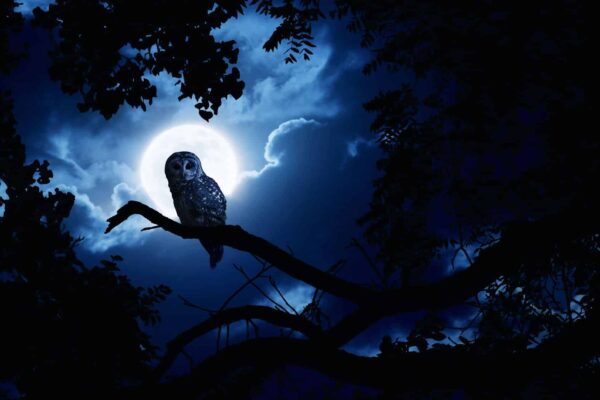Are you a night owl ?
Are you the kind of person who stays up late into the night reading, writing, working on your computer or tinkering? Are you best friends with your snooze button and secretly hate the so-called “beauty” of a sunrise? If you’re a night owl, you might have people telling you to go to bed earlier and learn to “be an adult.” You might have an angry boss who doesn’t understand why you’re never on time in the morning. You may even have a well-meaning friend telling you to get more sleep and touting the phrase, “Early to bed, early to rise, makes a man healthy, wealthy, and wise.” The notion that waking up early is a positive trait does have some merit. During the first few hours of the day, we can get tasks accomplished that we may otherwise avoid entirely, things like exercise, meditation, and studying. But just because the early bird gets the worm doesn’t mean that the night owl is left empty handed (empty beaked?). Studies show that night owls and those who wake up later actually are smarter and more creative than their early rising counterparts. They also have higher IQs according to The Independent. Unfortunately, night owls have slightly lower academic scores than early risers (by about 8%). The reason for all these differences is likely due to the difference in brain chemistry between late night creative types and early morning larks. Your predisposition to waking with the sun or staying up into the early hours of the morning is determined by your DNA. Both groups need a full 8-hours of quality sleep, but the way each group takes advantage of the other 16 hours has a profound effect on their abilities and experiences. Here are five ways night owls come out ahead.

They Have Higher IQs
From an evolutionary standpoint, we have always had a set circadian rhythm: waking up and falling asleep with the sun. Studies have shown that people with higher IQs are likely to deviate from familiar evolutionary traits, such as circadian rhythms. Night owls who opt to wake up in the later hours of the day and stay awake until the wee small hours of the morning may be exhibiting a form of evolution. In any case, people with divergent circadian cycles are considered to be more intelligent than those with normal sleep cycles.
They Are Less Tired Throughout The Day
The biggest practical difference between early risers and night owls is the chunk of time that they maximize. Early risers maximize their mornings. They usually wake up before everyone else to accomplish tasks like working out, getting ready for work, or working on hobbies. Night owls, on the other hand, maximize the evenings. A recent study aimed to discover when each group was strongest. They tested early risers and night owls throughout the day and found that night owls hit their peak strength at 9 p.m. This is because their central nervous system and spinal cord excitability are each peaking at the same time. This gives night owls a burst of energy in the evenings to put toward things like creative endeavors, invention, and imagination. Early risers, on the other hand, never reach this same level of strength because their central nervous system and spinal cord excitability never line up at the same time. They hit a peak around 9:00 a.m., and then experience a downhill slope from there. By the time early birds are falling asleep, night owls are hitting their stride. The never start to slump until they’re ready to hit the pillow.
They Are Less Stressed
People who wake up early have higher levels of cortisol, the body’s main stress hormone, than those who sleep in. In fact, people who woke before 7:21 a.m. not only had higher levels of cortisol upon waking, but they maintained those higher levels throughout the day. In a 10-week follow up study with this same group, researchers found that early risers were more likely to suffer from muscle aches, headaches, and cold symptoms. They were also more likely to feel angry throughout the day and exhausted by the end of the day than their night owl counterparts.

They Are More likely To Experience Creative Breakthroughs The evening hours are the perfect time to experience a creative breakthrough, whether or not you consider yourself a night owl. When we are tired, our minds get to wander. This is the perfect opportunity for creativity to strike. We can allow ourselves to follow distractions, and our tired mind is less likely to get caught up in the logistics of our ideas, allowing us to experience pure imagination. Both night owls and early risers benefit from this nocturnal creative juice, but early risers experience it much less frequently.
Early risers are missing out on valuable hours
Previous studies have proven that night owls are smarter and richer than early risers, but recent findings show that they are also quicker and more alert when doing complex tasks throughout the day. In one study, participants were asked to maintain their normal sleep cycles, with early risers falling to sleep about four hours before the night owls. These participants were then asked to complete various activities, with their success tracked by researchers. Both groups were clear and alert upon waking up, but ten hours into their respective days, early risers showed less action in parts of the brain linked to attention. Even though each group was awake the same amount of time, the night owls maximized their brain’s abilities throughout the day, while the early risers experienced less cognitive function. So, the next time your best friend tells you to go to bed at a “reasonable” hour, you can rest assured that your sleeping habits aren’t costing you anything. In fact, they may be responsible for a higher IQ, and a richer, happier future. Just ask Charles Darwin and Winston Churchill, both were famous and successful night owls. The early bird might get the worm, but night owls get a whole field of bugs. And who wants a worm anyway? For all your sleep questions please reach out to Peninsula Doctor.



